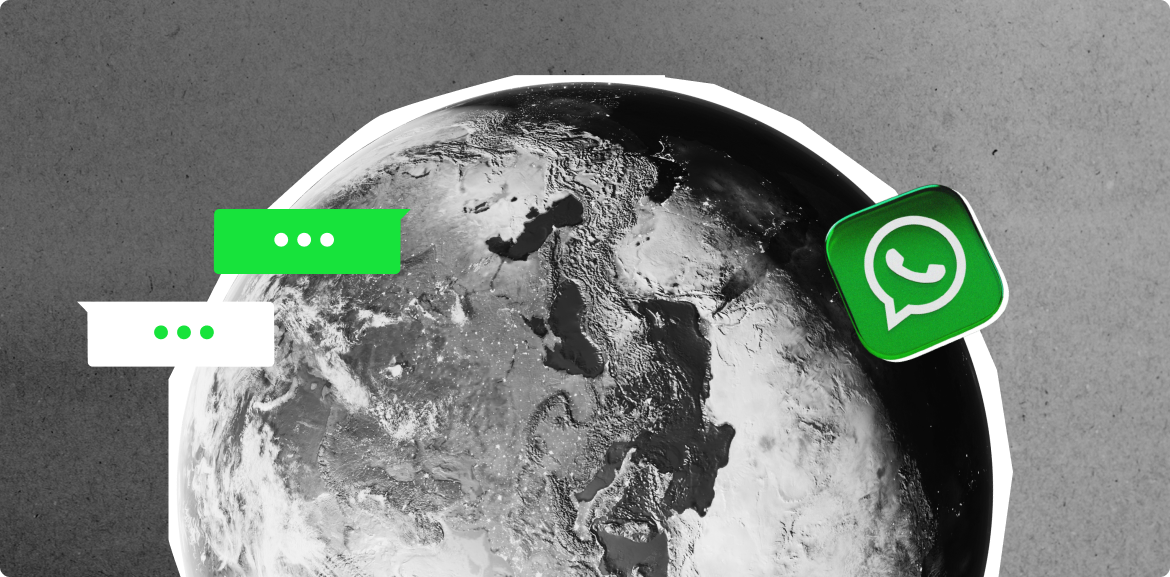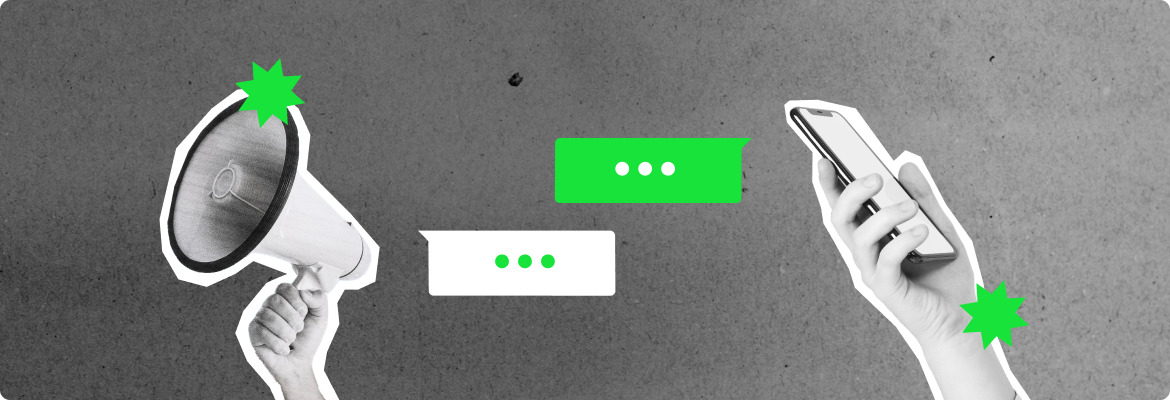Role of WhatsApp in Lifting Sales

WhatsApp, originally designed as a simple messaging app, has grown into an indispensable communication tool for businesses globally. Customer-focused businesses are increasingly using the channel to stay connected with their customers 24/7, answer their questions, tell them more about their products, guide them throughout their purchase and offer post-sales support. WhatsApp has seen a huge surge in the number of medium and large enterprises using it in the last few years. Almost 316 million WhatsApp Business downloads were made by users globally in 2023, and this number is only expected to rise. As per data shared by WhatsApp itself, more than 175 million people every day message a WhatsApp Business account, and more than 40 million people view a product catalog on WhatsApp Business app every month. WhatsApp Business reached 200 million monthly active users in June 2023, a 4x increase from 50 million reported in July 2020. WhatsApp is not just a great marketing and customer support tool, it’s also a key contributor in boosting sales directly.
What Makes WhatsApp Great as a Sales Tool?
With WhatsApp becoming an integral part of people’s lives, businesses across industries have quickly capitalized on its potential as a tool for direct, one-to-one conversations with customers. Even small budding businesses now use the free version of WhatsApp to effectively boost sales and enhance customer relations. Small businesses use WhatsApp to send updates and promotional materials directly to customers who have opted in. This can include announcements of new products, special offers, and Exclusive Discounts codes. Since WhatsApp messages have a high open rate, promotions sent via WhatsApp are likely to be more effective than those sent through email. WhatsApp can also be utilized for answering questions about products, discussing pricing, or assisting with the decision-making process. This kind of support is crucial in converting inquiries into sales.
For medium and large businesses, it is the WhatsApp Business API, WhatsApp’s paid business solution tool, that has become a critical tool when it comes to not just customer support but sales. Before making a purchase, customers typically want to make sure they are taking the right decision. They have plenty of questions they want answered – they want to know more about a product’s pricing, discounts, delivery options, shipping policy, refunds policy, and whether similar products are available. And they want answers quickly without going through the hassle of having to call up the business, read up lengthy website pages, or fill in long inquiry forms. With chatting being the most preferred form of communication these days, customers typically prefer brands that have a messaging channel where they can get their pre-sales questions answered as well as request post-sales support. And they are more likely to make a purchase when they are able to contact the business to get their questions answered quickly. For businesses, WhatsApp fits the bill perfectly. Not only is it wildly popular with over 2.7 billion active users, it facilitates direct, chat-based conversations, where sales associates (or bots) can handhold prospects and customers and move them up the sales funnel.

WhatsApp offers several advantages in the sales domain
#1 Ease of Messaging
These days, customers are quite comfortable both sending and receiving messages from businesses. They do not want to waste time calling up brands, and neither do they appreciate receiving spammy calls which do more harm than good. They prefer to message a business the same way they would a friend, and WhatsApp, with its user-friendly interface and worldwide popularity (with a presence in over 180 countries), is a great way for brands to directly connect with a customer. Customers spend more time on WhatsApp than on any other app (averaging almost 17 hours a month in 2024 so far), so for businesses it’s the best opportunity to connect with customers where they are. Also, the app’s asynchronous nature of messaging is something that works for customers as they can reply to a message at a later time when it’s convenient for them, making the interaction less intrusive and more customer-centric.
#2 Business-Friendly Features
The WhatsApp Business API, with its business-friendly features, is particularly suited for sales. Let’s look at them:
Business Profile: To begin with, companies can create their business profile with additional details like their name, category, logo, address, and website and get a verified green tick, which creates a sense of trust and authenticity among customers that they are chatting directly with the brand and not just a sales person with a private account. Unlike with personal phone numbers, WhatsApp Business allows for centralized communication, ensuring that all interactions are stored and managed systematically.
Product Catalogues: Companies can build and share product catalogs featuring high-quality images, detailed descriptions, pricing information, and direct CTA links to simplify browsing and purchasing. Businesses can upload, refresh, and oversee their catalogs on WhatsApp, ensuring a convenient and customer-friendly shopping experience.
Powered by Bots: WhatsApp conversations can be powered by chatbots that are incredibly versatile, handling everything from answering frequently asked questions to guiding customers through the purchase process. They are available 24/7, providing immediate assistance at any time of day, which significantly enhances customer satisfaction and can lead to increased sales. Also, chatbots serve a wide variety of sales use cases including:
– answering questions about products
– suggesting products based on customers’ interests, needs, or past history
– using pre-approved templates to send invoices to customers
– providing real-time delivery-related updates to keep customers up to speed
– offering post-sales support like initiating returns and refunds
– cross-selling and upselling, increasing sales
– sending proactive alerts each time a product is available again
– recovering abandoned carts
– collecting feedback over chat
Automated Reply Options: The business API also has features like automated quick replies and interactive CTA buttons that enable quicker performance of tasks and increase the customer’s chances of making a purchase without having to leave the chat window. They help to make the whole process more frictionless.
Payments: This function, currently available only in a few regions like India, helps customers make payments directly from the app without having to leave the platform.
Rich Messaging: Businesses can share different types of content including text, images, pdf files, video tutorials, locations, weblinks, etc. on WhatsApp, which enriches the brand’s appeal.
WhatsApp Groups: Sales managers are finding WhatsApp groups to be exceptionally useful for creating dynamic communication channels. By setting up groups that include multiple customer representatives and other sales managers, they can significantly speed up the decision-making process. This method proves especially effective in scenarios where quick coordination is needed, allowing team members to share information in real-time and make swift collective decisions.There is a perceptible shift away from email communication to Whatsapp communication, even among B2B players. However, email still holds a significant place in business interactions, particularly for formal and substantial exchanges. Important discussions that require detailed explanations, formal proposals, and sensitive information are generally more suited to email, providing a record that can be archived and referred to later. WhatsApp complements this by handling the more dynamic, conversational aspects of communication.
#3 Integration With Existing Systems
By syncing WhatsApp communication with a CRM system, businesses can automatically update customer profiles with new data from each interaction. This continuous updating provides sales teams with rich, actionable insights into customer preferences, behavior, and purchase history, enabling them to tailor their sales strategies effectively. Also, with WhatsApp integrated into ERP or CRM systems, sales teams can automate various parts of the sales process, such as sending product information, quotes, and payment reminders. This automation helps in speeding up the sales cycle and reducing the workload on sales representatives, allowing them to focus on closing more deals and generating new leads. Another benefit of integrating WhatsApp API with the CRM system is that no leads are lost due to negligence or delays in response. Automated messages can be set up for various scenarios, such as re-engaging a customer who has shown interest but hasn’t made a purchase or following up post-purchase for feedback. Also, a huge advantage of the CRM integration is that multiple team members can use WhatsApp at the same time and respond to WhatsApp messages directly in the CRM.
#4 Data-Driven Decision Making
WhatsApp interactions generate plenty of valuable data, which can be analyzed to understand customer needs and preferences better. Brands can keep track of how well their campaigns are working. WhatsApp chatbots are typically connected to a CRM, so any review the customer shares on WhatsApp gets registered in the CRM and can be used later to measure customer satisfaction. Data collected on WhatsApp can drive more informed sales strategies, product development, and marketing campaigns, leading to higher conversion rates.
#5 Reduced Load on Call Centers
Businesses can use WhatsApp to answer incoming questions, even automate handling of routine queries, taking the pressure off call centers that are inundated with calls from customers. Sending in a message on chat is not just more convenient for the customer, it is easier for businesses to handle queries on WhatsApp as a single sales representative can handle multiple conversations on WhatsApp simultaneously, which is simply not possible over phone calls.

WhatsApp Sales Use Cases
WhatsApp can be used at different stages of the sales funnel.
Lead Generation
WhatsApp can be an effective tool for generating leads. Businesses can share WhatsApp links with potential customers on various platforms like their websites, emails, social media accounts, etc. Those who click on the link can be redirected to the business’s official WhatsApp account where they can start chatting with the brand. This method is less intrusive than traditional cold calls and allows potential customers to engage with the business on their terms.
Conversions and Relationship Building
Once a lead is generated, they can be routed to the most suitable agent who would already be armed with the customer’s contact details and interaction history, and can guide the customer in the quickest and most efficient way, shortening the query-to-conversion cycle. This can be particularly useful for explaining complex products or services. The agent can share personalized marketing messages based on the customer’s previous purchases and interactions. This can include tailored promotions, discounts, or alerts about new products that match the customer’s interests, significantly increasing the relevance and effectiveness of marketing efforts.
Closing Sales and Follow-Ups
Once a lead shows interest, sales teams can use WhatsApp to nurture these leads towards conversion. This might involve answering questions, providing additional information, discussing pricing, or helping with decision-making processes. The immediacy of WhatsApp facilitates quick exchanges, speeding up the sales cycle. Once the customer decides to purchase, the team can share confirm the order and share payment links (in regions where WhatsApp Payments is available) to complete transactions within the app. This integration can significantly enhance the customer experience by providing a one-stop solution for browsing, decision-making, and purchasing.
Post-Sales Support
Post-sale support is crucial for a positive customer experience. WhatsApp allows businesses to offer after-sales support directly through the app, addressing issues, processing returns, and even scheduling maintenance or follow-up services.
Re-engagement Campaigns
WhatsApp is an effective channel for re-engaging dormant customers. By sending personalized messages or special offers to customers who haven’t interacted with the business in a while, companies can reignite interest and potentially recover lost sales.
Effective Strategies for Sales Teams to Optimize Use of WhatsApp
Optimizing the use of WhatsApp can significantly enhance sales team performance by improving customer engagement and streamlining communication processes. Here are some actionable tips for sales teams looking to maximize the benefits of WhatsApp Business API:
Train Your Team: Regularly train your sales team on the best practices and new features of various WhatsApp products. Ensuring that all team members are proficient in using the platform can lead to more effective engagements and better use of the tool’s capabilities.
Monitor and Analyze Performance: Use analytics to track the effectiveness of your WhatsApp strategies. Monitor metrics such as response time, message open rate, conversion rate, and customer satisfaction. Use this data to refine your approach, focusing on strategies that yield the best results.
Ensure Compliance and Privacy: Make sure that your use of WhatsApp complies with relevant data protection regulations (like GDPR) and WhatsApp’s own policies. Be transparent with customers about how their data will be used and ensure their privacy is protected.
Segment Your Audience: Create different customer segments based on their behavior, needs, or demographic information. Tailor your communication strategy for each segment to improve relevance and effectiveness. This can include different types of follow-up messages, promotional offers, or informational content tailored to specific groups.
“>Optimize Message Timing: Timing is crucial when engaging customers. Analyze when your customers are most active on WhatsApp and schedule your messages accordingly to increase the likelihood of reads and responses. Avoid sending messages too early in the morning or too late at night unless it is common practice in your industry or region.
“>Encourage Two-Way Communication: Promote an interactive communication style that encourages customers to respond and engage. Ask questions, request feedback, and involve customers in conversations that make them feel valued and listened to.
By implementing these strategies, sales teams can maximize the potential of WhatsApp Business API as a powerful tool for enhancing customer relationships, streamlining sales processes, and boosting overall sales performance.




![[photo]](https://edna.io/wp-content/themes/edna/images/authors/rajrupa-ghoshal.jpg)
![[icon]](https://edna.io/wp-content/themes/edna/images/authors/ico-linkedin.svg)